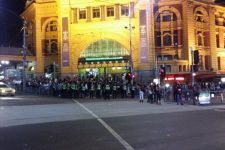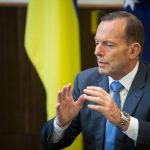Government to Deport Alleged Apex Gang Members

According to Victoria police, a good way to deal with the state’s crime problem is to deport young adult gang members. A parliamentary body is also considering whether those under the age of 18 can also be turfed out of the country.
A list of people who are said to meet the requirements for visa cancellations – including four alleged adult members of the Apex gang – has been handed over to the Australian Border Force.
The four alleged members include three men from New Zealand and one from Sudan, two of whom are 19 years of age.
A Victoria police spokeswoman explained that it was an established process for non-citizens who no longer meet visa requirements to be deported.
Deportation on character grounds
Tough changes were made to the Migration Act 1958 back in December 2014, which have resulted in non-citizens being deported on character grounds.
For instance, under the Migration Amendment (Character and General Visa Cancellation) Act 2014 it is now mandatory to deport non-citizens if they are sentenced to terms of imprisonment that total 12 months or more.
But more than that, the immigration minister is now empowered to order the deportation non-citizens, and even those who have dual citizenships, in certain circumstances if he believes they fail to meet the character test, even in the absence of any criminal convictions.
Immigration minister considers deporting children
Immigration minister Peter Dutton told Radio 3AW that the Victorian government needed to do more to address gang violence. “Unfortunately, over recent times, the activity of the Apex gang and others have meant that Melbourne is in the headlines for the wrong reasons,” he said.
The minister explained that a parliamentary committee was investigating whether children can be deported. The “committee is having a look at whether, for example, the bar can be lowered from 18 to 17 or 16,” Dutton remarked.
Youth crime rates
Victoria police figures released in November last year, suggesting that the rate of aggravated burglaries committed by teenagers had tripled, with 542 offences committed over the preceding twelve months, compared with 187 in the previous year.
The figures suggest that car thefts by teenagers were up too. 1,872 vehicles were reported stolen over the past financial year, compared with 1,269 in 2011-12.
However, the rate of teen robberies had remained stable for five years, and the rate of burglaries committed when the victim was not at home was declining, along with a number of other categories of crime.
A group of serial recidivists
According to Victorian acting assistant commissioner Sue Clifford, there’s been an overall decrease in the number of young people committing crimes, with a disproportionate amount of crime attributable to a small group of serial offenders.
The mainstream media has consistently linked these offenders with the Apex gang, depicting those born in Sudan and the Pacific Islands as especially problematic.
However, figures released by the Victorian Crime Statistics Agency in December suggest that an overwhelmingly number of teen aggravated robberies, car thefts and home invasions in the state are carried out by youths born in Australia.
The Apex gang
Founded in the suburb of Dandenong two years ago, Apex is a street gang said to have originally consisted of a small number of young Sudanese men.
But after it merged with another gang called YCW, its members grew to include youths with Caucasian, Pacific Islander and Indian backgrounds, amongst others.
The gang’s expansion is believed to be linked to associations formed within correctional centres, including Melbourne’s overcrowded and volatile Parkville youth justice centre.
Rather than acting as a deterrence to crime, the juvenile detention system has brought many young offenders together.
Riots at Parkville
Parkville juvenile detention centre has been the scene of continued rioting since March last year. On January 7, seven detainees allegedly threatened staff with metal bars, before climbing into a roof cavity and having a long standoff with police.
More than half the centre is now closed. Four units that were destroyed in rioting in November last year are still inoperable, and 73 of the centre’s 120 beds have been lost.
The state opposition has pointed out that there have been 28 riots within Victorian juvenile detention facilities over the past year. The latest one broke out at Malmsbury youth justice centre on January 12.
Locking up youths in adult facilities
Not only are Victorian authorities dishing out harsher sentences and considering deporting youths, they’re also sending children to adult prisons. After the recent riots at Malmsbury, four more youths were sent to the Barwon prison.
And following the Parkville riots in November last year, the state government announced it would be sending up to 40 youth detainees to the maximum security prison, 15 of whom were eventually detained there.
Despite the Victorian Supreme Court condemning the move and ordering the release of the children, eleven of them continue to be held there to the present day. And they could be stuck at the adult prison until the middle of the year, waiting on fortifications at the Parkville facility to be completed.
Last Friday, Victorian youth affairs minister Jenny Mikakos confirmed the Andrews government might soon scrap a dual-track option that allows some young adults aged up to 21 to serve their time in juvenile detention in order to improve their rehabilitation prospects.
Finally some rehabilitation options
In a positive move, Ms Mikakos announced on Saturday a $4 million package to fund strike teams of youth workers that will be sent out to assist South Sudanese teens and other “overrepresented” groups with any underlying issues, with a view helping them to avoid being trapped in a cycle of crime.
Eight organisations will receive grants to help up to 100 vulnerable young people in areas of disadvantage, such as Dandenong and Geelong.
The initiative is part of a broader diversionary strategy announced last year that allows youths to avoid convictions if they undertake rehabilitation programs, such as anger management and drug and alcohol courses.
Australia’s deportation system
Australia’s treatment of non-citizens has repeatedly come under heavy international criticism for several years now.
In 2011, the United Nations Human Rights Committee condemned Australia’s practice of deporting non-citizens as a violation of international law.
Since the laws were strengthened in 2014, significant numbers of New Zealanders have been deported for often accumulated minor offences.
On November 30 last year, New Zealanders made up the greatest number of people being held in the country’s onshore detention centres, with 184 Kiwis being detained. Whereas in February 2015, they didn’t even rank amongst the top nine groups of detainees.
Receive all of our articles weekly
Authors

Paul Gregoire







